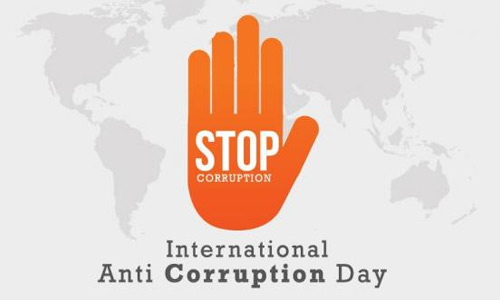Today is coincided with International Anti-Corruption Day which annually marked on December 9th. At the outset, it began with the adoption of the United Nations Convention against Corruption in 2003, which Afghanistan ratified in 2008. In Afghanistan, corruption came to be recognized as one of the key impediments to Afghanistan’s development and stability after 2001. Globally, every year about $1 trillion is paid as bribes while an estimated $2.6 trillion are stolen annually through corruption – a sum equivalent to more than 5 per cent of the global GDP. In developing countries, according to the United Nations Development Programme, the funds lost to corruption are estimated at 10 times the amount of official development assistance. No country, region or community is immune from corruption in the world. Therefore, Corruption should be considered as a serious crime undermining social and economic development in all societies.
Corruption affects all aspects of life, eroding public trust and confidence in government institutions and hindering efforts to bring lasting peace and prosperity to the country. Corruption also undermines rule of law and opens the door to more crime, creating a vicious cycle that fosters a culture of impunity. Studies show that nations which fight corruption and improve their rule of law can increase their national income by 400%. Fighting corruption is a key enabler of a self-reliant Afghanistan. Therefore, the government has to pay particular attention to effective management and oversight of customs, procurement and overall take fundamental measure against corruption.
In War-torn countries such as Afghanistan, it will not only endanger the prospects of peace and national integrity, but also push back the international aid from Afghanistan. The latest example for this was the US aid withdrawal from the country. As pointed out, corruption increase the distance between government and citizens. In the current year, Asia Foundation Survey shows that 81.5% of Afghan respondents think corruption as a major problem in Afghanistan. The reason for this is that corruption in Afghanistan has long history and it will be hard to root out in short time. Undeniably, some of NUG moves are appreciated but the history rooted corruption needs historic will to bring deep and structural reform in the country.
Today, marking the International Anti-Corruption Day, the second vice president, Sarwar Danish also confessed, “Despite some achievements, we have not been completely successful in fighting against corruption.”“The government needs to appoint honest people as leaders in every organization in order to fight corruption,” Danish said, adding: “Outside the government we also need strong organizations to fight against corruption.”“We need strong financial controls in government organizations – especially in financial departments -- to stop corruption,” Danish said. The government must improve the living conditions of government employees if it wants to stop corruption, he added.
One of the strategies against corruption which has been used in the country was largely focusing on recruiting and competing on government positions. The officials from the Administrative Reform Commission have repeatedly spoken of their achievements and successes in the recruitment process, but that has not been reflected in society and has not found its place in the public’s minds. Even, if we talk about balance and justice in the field of the country’s recruitment system, it seems unacceptable in public opinion.
The next challenge is an old mentality that is actively institutionalized in all administrative sectors of the country. Still, everyone in any position, think that the office under his control belongs to a particular ethnicity, which himself belong to. Still there are efforts to prevent certain ethnic and political groups from many of the country’s departments. For example, the security sector, ministry of foreign affairs and financial and economic sector are still prohibited areas for many citizens of the country. No one can hide the fact that the diplomatic apparatus and ministry of foreign affairs of the country were persistently monopolized by a small number of those who were close relatives of senior politicians and senior officials.
In such environment the talents and meritocracy are killed in the country. These are a few examples but many of the offices are in the same condition. Even the scientific and cultural institutions of the country are also suffering from the same condition. For example, along with dozens of scientific and research offices, there is an office called the “Academy of Sciences”, apparently they are responsible for the country’s scientific and research affairs but they are engulfed with a certain circle of monopoly that do not accept any kind of modernization. These are only parts of some structural corruption in the country’s administration, which has largely challenged the fight against corruption. Therefore, we can call the corruption in Afghanistan as a monstrous threat that still threatens our collective life, and we have a long way to go.
Overall, the NUG moves are appreciated against corruption but as abovementioned, the history rooted corruption needs strong political will to bring deep reform in the country. Deep reform is not only important in terms of fighting against corruption but also important in national trust and national unity. We need to push through key civil service reforms and ensuring the verification of asset declarations of all senior public officials and the imposition of sanctions for failure to register. The government should continue its recent progress in simplifying business processes and reducing red tape in order to further reduce the opportunities for administrative corruption. To end with, the government departments, business, civil society organizations and donors need to work together in the fight against corruption in Afghanistan.
Home » Opinion » International Anti-Corruption Day Marked in Afghanistan
International Anti-Corruption Day Marked in Afghanistan
| Mohammad Zahir Akbari

